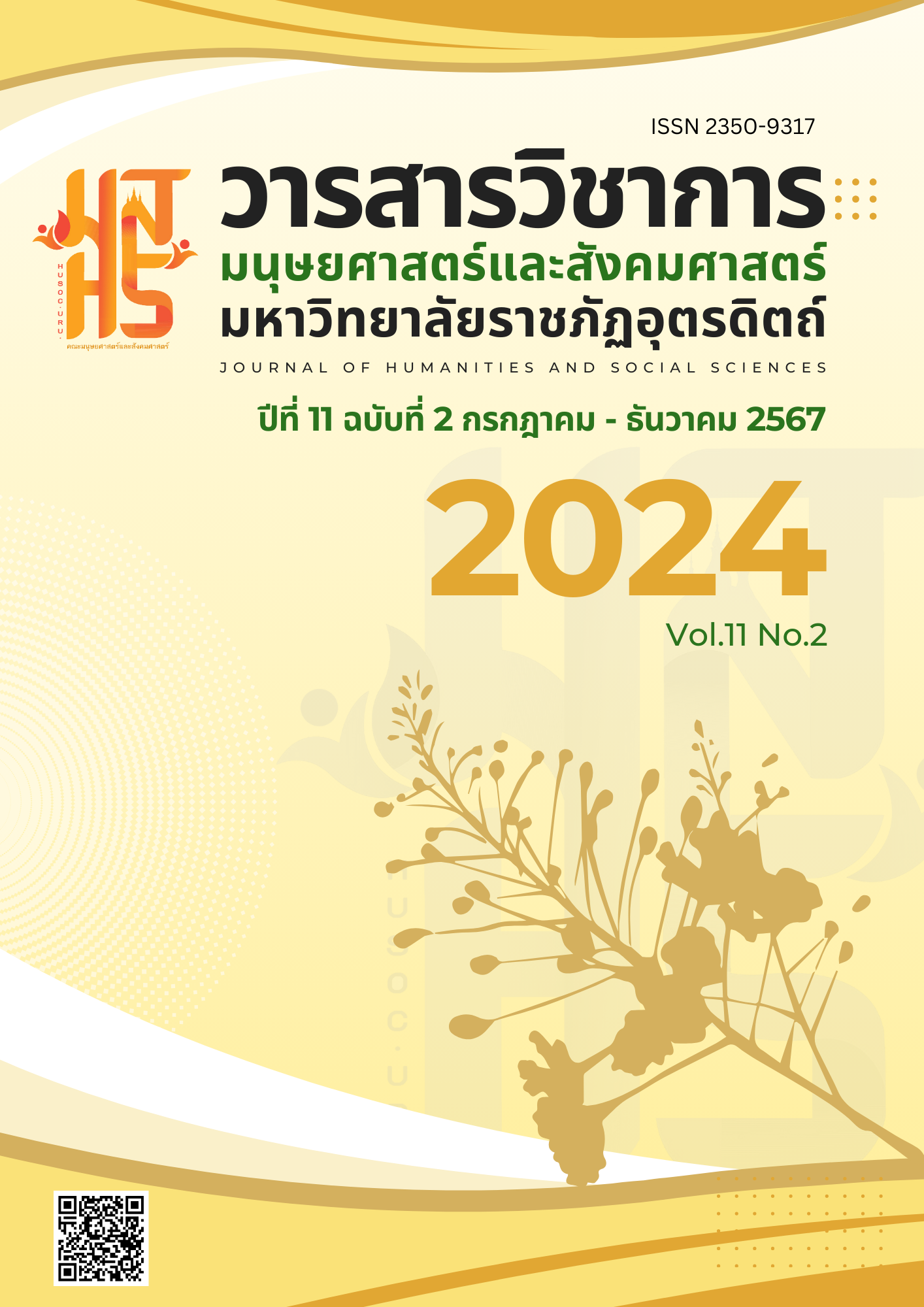The CIVIC CONSCIOUSNESS WITH CONTEMPLATIVE EDUCATION AND COLLABORATIVE LEARNING
Civic consciousness , Contemplative Education, Collaborative learning
Keywords:
Civic consciousness , Contemplative Education, Collaborative learningAbstract
The word ‘citizen’ is very important in building a strong community, society, and nation that has quality progress. Many countries around the world place great importance on building citizenship, who through education to Civic Education for the people of the nation, especially children and youth. Because today’s children are tomorrow’s adults. So civic consciousness with contemplative mind and making understanding of inner dimensions on emotion, felling, thought and belief of event and situations knowingly with contemplative education aims at bringing about change to human learning, expressing human ‘value’ within ‘self’, raising civic consciousness with contemplative and connect external dimensions. This could be combined with the impact of people and society with collaborative learning. It aims to bring about a fundamental change in thinking and stimulate citizenship consciousness among children and youth. In order for students to learn their roles, duties, rights, and freedoms when living with others in society.
In this article, the meaning of citizenship, importance on building citizenship, civic consciousness, the meaning of contemplative, organizing collaborative learning and example on building civic consciousness too contemplative and collaborative learning for as a guideline to building civic consciousness to be aware of the concrete changes.
References
จิระพร ชะโน. (ม.ป.ป.). การจัดการเรียนรู้ตามแนวจิตตปัญญาศึกษา. วารสารครุศาสตร์ มหาวิทยาลัยราชภัฏอุตรดิตถ์.
จิตสุภา กิติผดุง และวทัญญู ใจบริสุทธิ์. (2565). แนวทางพัฒนาการสอนวิชาพลเมือง: แนวคิดและทักษะของพลเมือง
ในยุค New Namal. วารสารรัชต์ภาคย์, ปีที่ 16 ฉบับที่ 45 มีนาคม-เมษายน 2565-TCI กลุ่ม 1 มนุษยศาสตร์
และสังคมศาสตร์ ปี 2564-2567
จุมพล พูลภัทรชีวิน. (ออนไลน์). การตกผลึกและระเบิดประสบการณ์ทางจิตตปัญญาทัศน์จิตตปัญญาปฏิบัติ.
https://jitwiwat.blogspot.com/2012/06/blog-post_22.html สืบค้นเมื่อวันที่ 12 ธันวาคม 2566
ถวิลวดี บุรีกุล และคณะ. (2563). การศึกษาพฤติกรรมความเป็นพลเมือง สำหรับสังคมไทย. กรุงเทพฯ:สถาบันพระปกเกล้า.
ทิพย์พาพร ตันติสุนทร. (2554). การศึกษาเพื่อสร้างพลเมือง. กรุงเทพฯ : สถาบันนโยบายศึกษา
ปริญญา เทวานฤมิตรกุล. (2558). การศึกษาเพื่อสร้างพลเมือง (Civic Education). กรุงเทพฯ: บริษัทนานมีบุ๊คพับลิเคชั่น.
ประเวศ วะสี (2550). มหาวิทยาลัยไทยกับจิตตปัญญาศึกษาและไตรยางค์แห่งการศึกษา. กรุงเทพ ฯ : ศูนย์จิตตปัญญา
ศึกษา มหาวิทยาลัยมหิดลและแผนงานพัฒนาจิตเพื่อสุขภาพ สนับสนุนโดยสานักงาน กองทุนสนับสนุนการสร้าง
เสริมสุขภาพ.
แผนปฏิรูปประเทศฉบับปรับปรุง ฉบับประกาศราชกิจจานุเบกษา 25 กุมภาพันธ์ 2564. เข้าถึงเมื่อ ธันวาคม 2566 จาก
พิชญ์อนงค์ ผดุงศิลป์ไพโรจน์. (2559). การสอนความเป็นพลเมืองด้วยการเรียนรู้ร่วมกัน. วารสารครุศาสตร์ คณะครุศาสตร์
มหาวิทยาลัยราชภัฏกำแพงเพชร, ปีที่ 1 ฉบับที่ 2 กรกฎาคม-ธันวาคม 2559
รัฐธรรมนูญแห่งราชอาณาจักรไทย พุทธศักราช 2560. พิมพ์ครั้งที่ 4. กรุงเทพ ฯ : สถาบันพระปกเกล้า.
วิจักขณ์ พานิช (2550). เรียนรู้ด้วยใจอย่างใคร่ครวญ. กรุงเทพฯ : สานักพิมพ์สวนเงินมีมา.
ศรัณยุ หมั้นทรัพย์. (2565). ความเป็นพลเมืองไทยกับการขับเคลื่อนแผนปฏิรูปด้านการเมือง : กรณีศึกษาการดำเนินงาน
ของศูนย์พัฒนาการเมืองภาคพลเมือง สถาบันพระปกเกล้า Thai citizenship and Political Reform
Driving: Case Study of Center for Civil Political Development, King Prajadhipok's Institute.
กรุงเทพฯ : สำนักส่งเสริมการเมืองภาคพลเมือง สถาบันพระปกเกล้า.
ศิริชัย เพชรรักษ์ และ วราภรณ์ ทรัพย์รวงทอง. (2564). การสร้างสำนึกพลเมืองของนักเรียนในจังหวัดลพบุรี. วารสารรัชต์
ภาคย์, ปีที่ 15 ฉบับที่ 43 พฤศจิกายน-ธันวาคม 2564-TCI กลุ่ม 1 มนุษยศาสตร์และสังคมศาสตร์ ปี 2564-2567
สถาบันนโยบายการศึกษา. (2557). แนวทางการศึกษาเพื่อสร้างพลเมืองในสังคมประชาธิปไตย. กรุงเทพฯ: สถาบันนโยบาย
ศึกษา ภายใต้มูลนิธิส่งเสริมนโยบายศึกษา.
สำนักงานเลขาธิการสภาผู้แทนราษฎร. (2559). การเสริมสร้างความเป็นพลเมืองในระบอบประชาธิปไตย. กรุงเทพฯ :
สำนักพิมพ์สำนักงานเลขาธิการสภาผู้แทนราษฎร.
อมรรัตน์ วัฒนาธร. (ม.ป.ป.). ครูเพื่อศิษย์: ศิษย์เพื่อครู. เอกสารรวมบทความวิชาการด้านหลักสูตรและการสอน เพื่อเป็น
มุทิตาคารวะแด่ ผู้ช่วยศาตราจารย์ ดร.อมรรัตน์ วัฒนธร ในวาระเกษียณอายุราชการ
ออนไลน์ : https://www.urbinner.com/post/contemplative-education, สืบค้นเมื่อ 12 ธันวาคม 2566
Dalton,R.J. (2008). Citizenship norms and expansion of political participation. Political Studies,56,76-98.
Marshall,T.H. (2002). Citizenship and social class. InB.S.Turner and P.Hamiton(Eds.) Citizenship: Citical
concept volum II. (pp.5-44) New York: Routledge.
Satararuji, K. (2008). The Lessons Learned from the Youths’ Group Communication Process Regarding
Public Consciousness. Bangkok: Dhurakij Pundit University.
Downloads
Published
How to Cite
Issue
Section
License
Copyright (c) 2024 Journal of Humanities and Social Sciences Uttaradit Rajabhat University

This work is licensed under a Creative Commons Attribution-NonCommercial-NoDerivatives 4.0 International License.
บทความเป็นลิขสิทธิของคณะมส. มรภ อต.



